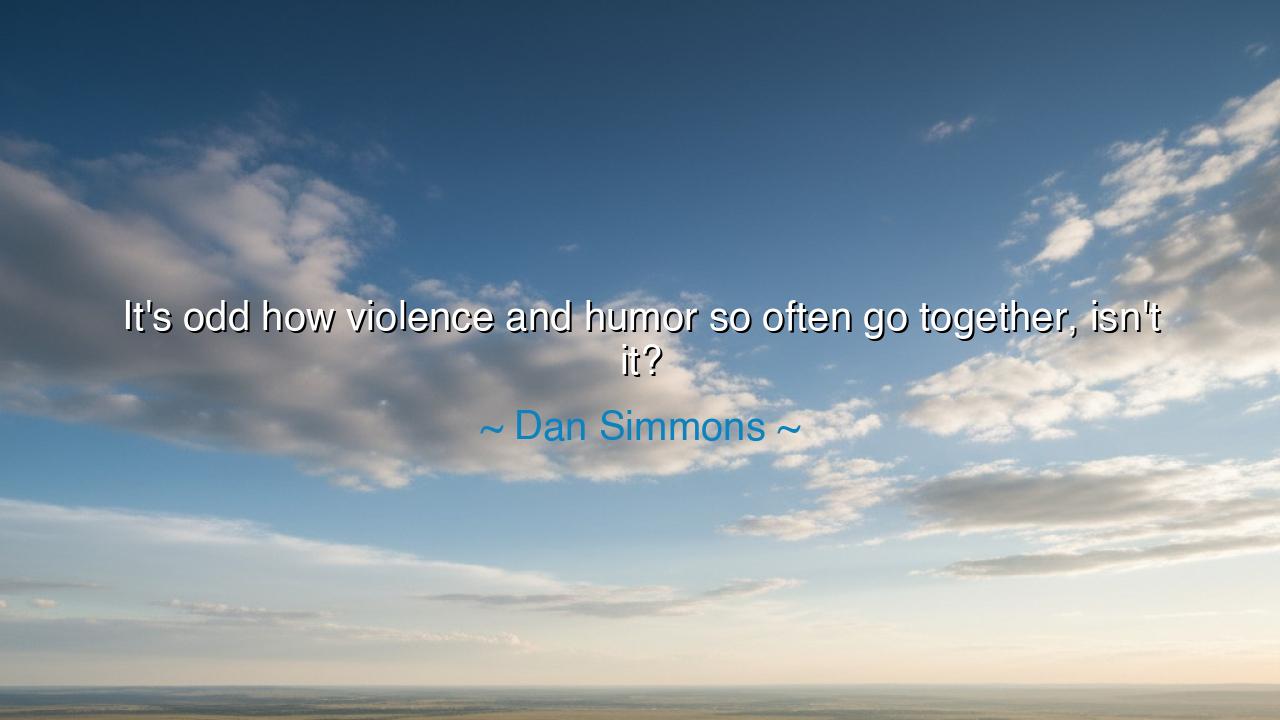
It's odd how violence and humor so often go together, isn't it?






The writer Dan Simmons, whose imagination has walked both the light and shadowed corridors of the human soul, once observed: “It’s odd how violence and humor so often go together, isn’t it?” In this single line lies a deep reflection on the dual nature of mankind — the strange, almost mystical coexistence of cruelty and laughter within the same heart. Simmons, a master of both horror and beauty, speaks here not with mockery but with awe. His words reveal that humor and violence, though seemingly opposite, spring from the same mysterious source — the human attempt to make sense of chaos, pain, and the unbearable weight of existence.
To understand this truth, one must first look at the nature of humor itself. Laughter often emerges not from comfort, but from discomfort; not from peace, but from the edge of suffering. It is the mind’s rebellion against despair. In times of war, oppression, or terror, laughter becomes both shield and sword — a means to survive when dignity and safety are stripped away. It is the fragile, trembling voice of the human spirit saying, “I am still here.” Thus, Simmons’s insight is not strange at all; it is ancient. It tells us that humor, when born beside violence, is not cruelty — it is defiance. It is life’s way of enduring its own tragedy.
The ancients knew this paradox well. The philosopher Aristophanes, writing comedies in the age of Athenian war, filled his plays with laughter that mocked both generals and gods. His humor was sharp, even brutal, yet it carried truth. Amid the violence of his world, he made people laugh — not to forget their suffering, but to face it without fear. And centuries later, the soldiers of World War I would do the same. In the mud of the trenches, surrounded by death, they told jokes so dark that only those who had seen the abyss could laugh at them. Their laughter was not joy; it was resistance. It kept their souls alive when reason might have surrendered.
Simmons’s words also echo through the works of writers like Shakespeare, who mingled murder and mirth with uncanny precision. In Macbeth and Hamlet, even as blood is spilled, the jesters speak — grim, mocking, uncomfortably human. Why? Because Shakespeare understood that laughter can cut as deeply as any dagger. Humor, like violence, exposes vulnerability. It reveals what we fear, what we cannot control. The difference is that where violence destroys, humor transforms. It takes horror and turns it into story, turns suffering into understanding. It allows us to look upon the darkness and, for a moment, laugh in its face.
And yet, Simmons calls it odd — for it is indeed strange that laughter so often walks beside cruelty. We laugh at the foolishness of villains, the absurdity of chaos, the irony of fate. In doing so, we reclaim a measure of power. Humor becomes the art of survival — the light that flickers even in the furnace. In this way, humor and violence are both responses to the same truth: that life is fragile, unpredictable, and filled with conflict. The sword strikes to control that chaos; the joke smiles to endure it. Both arise from the same trembling heart that seeks meaning in a world that often offers none.
The lesson within Simmons’s words is both sobering and redemptive. We must learn to recognize the sacred purpose of laughter — even the uneasy, dark kind. When you encounter humor born from pain, do not dismiss it as callousness; see it as the soul’s last defense against despair. In your own life, when hardship strikes, allow yourself the grace to laugh. Not to mock suffering, but to survive it. For laughter, rightly used, purifies the heart; it reminds us that even in the face of cruelty, our spirit remains unconquered.
So, remember this, seekers of wisdom: laughter is not the opposite of pain — it is the echo of endurance. The world has always been cruel, and men have always answered that cruelty with both swords and smiles. When you laugh in dark times, you join the lineage of all who have faced the storm and chosen not to break. As Dan Simmons reveals, humor and violence are not strangers but twins — born from the same struggle, one destroying, the other healing. And if you must choose which to wield, let it be laughter, for though both are powerful, only laughter can turn the wound into wisdom and the horror into hope.






AAdministratorAdministrator
Welcome, honored guests. Please leave a comment, we will respond soon